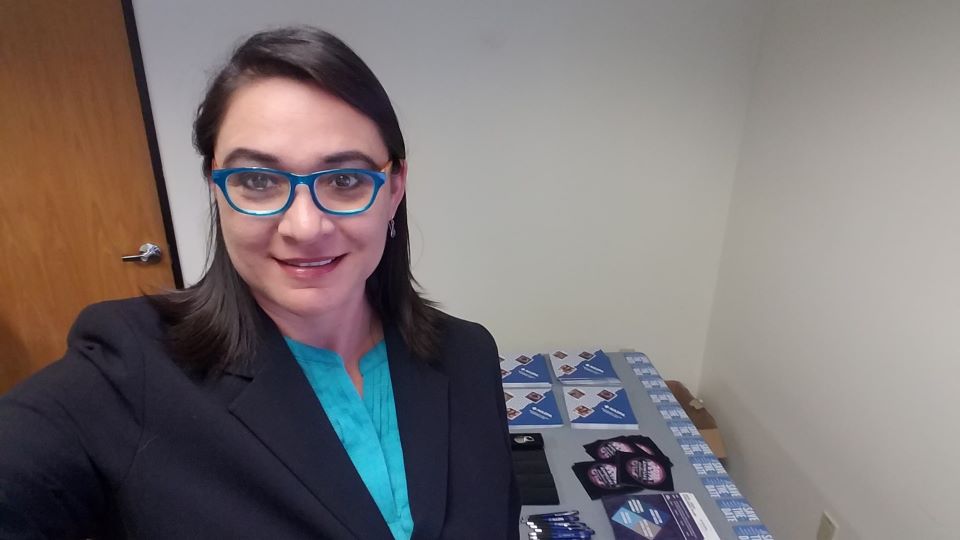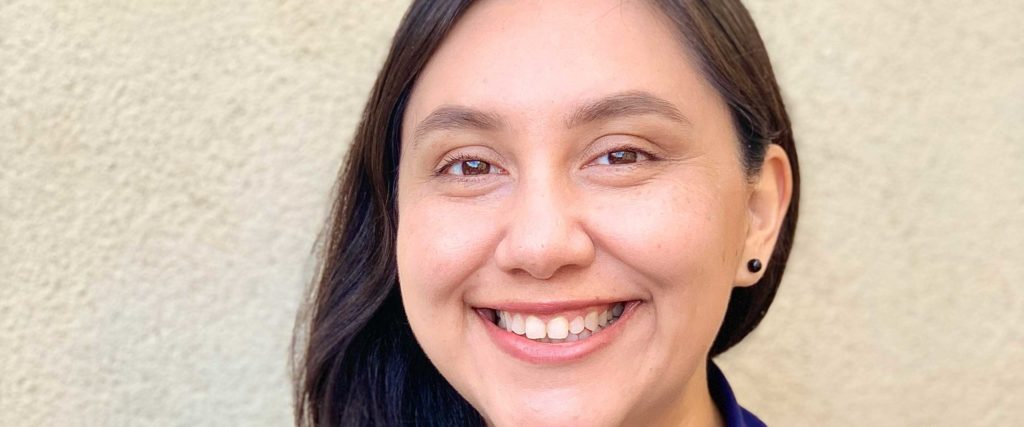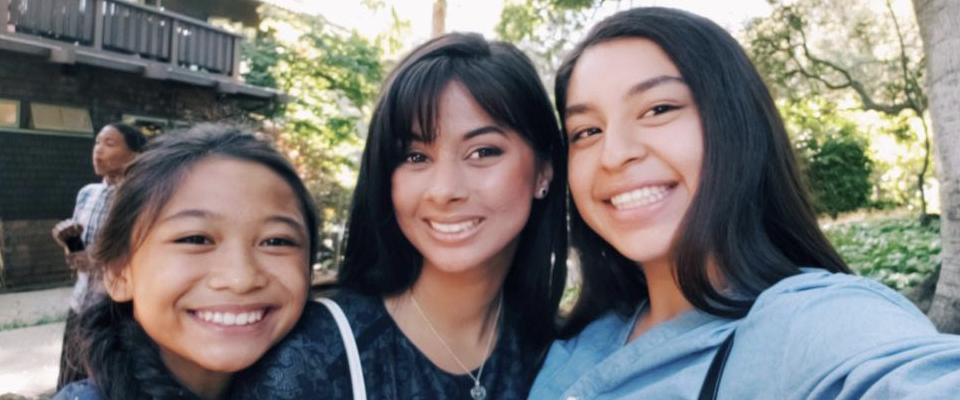While Lily Espinoza Ploski ’98 had always known that she wanted to attend UC Berkeley, she never imagined that she would pursue several more degrees after graduating from Cal: an A.A. in liberal studies, a master’s in student personnel administration, and an Ed.D. in educational leadership.
“Never in a million years did I imagine I’d go to school this much,” Lily laughs. She still has one degree to finish, but already promised her son it would be her last. “I told my son to remind me that I’d already said, ‘This is my last one!’” Lily adds.
The decision to earn this many degrees came about naturally as Lily solidified her goals to work within the higher-education system. She explains, “I want to talk about policy in higher education; address what colleges are doing for the well-being of their students; work with administrators to support healthy initiatives addressing mental health, depression, and anxiety; and carry this work out on an international level.”
Pie in the sky
Lily grew up in Orange County, in a family with five siblings. Her mother immigrated to America from Mexico at age sixteen, without an education, and found work as a domestic worker. Her Polish father was a retired Air Force pilot from Connecticut. Lily and her siblings were, in her words, “a group of kids just trying to figure stuff out.” They all felt the drive to pursue higher education, but didn’t know how or where that path would take shape.
“There were great student clubs and leadership on campus, but as a half-Mexican, half-Polish student, I was looking for my niche, and I couldn’t find it. All the people who’d I’d grown up going to high school with weren’t at Berkeley.”
“The other kids in my family were smarter,” Lily states. One of her younger sisters was admitted to Berkeley immediately after high school, but Lily’s path first led her to community college in the East Bay at Diablo Valley College. When she later applied to transfer into the UC system, Berkeley was, she recalls, “My pie in the sky. It was the best university I could get into.” Lily was ultimately accepted at Cal as a spring admit, and she wasted no time in accepting her offer.
The location and atmosphere of the Cal campus was everything Lily had hoped for her college experience, but the student population didn’t reflect the state of California as she’d been expecting. “There were great student clubs and leadership on campus,” Lily says, “but as a half-Mexican, half-Polish student, I was looking for my niche, and I couldn’t find it. All the people who’d I’d grown up going to high school with weren’t at Berkeley.”
As a Cal student in the 90s, Lily remembers protesting with her classmates against Propositions 209 and 87. The former, passed in 1996, banned affirmative action in public education. The latter, which has since been repealed, established a state-run screening system for citizenship and prohibited undocumented immigrants from entering public education systems. These two laws led to a dramatic drop in the number of students from minority backgrounds in the UC system.
Against this sociopolitical backdrop, with her women’s studies coursework from community college, Lily decided to continue pursuing her education in women’s studies at Berkeley. “There was a lack of discussions about relevant, social issues, and in my women’s studies classes, I was able to continue having conversations that exposed flaws in the systems of operation that aren’t commonly visible.”

Not getting stuck
Lily’s first job out of college wasn’t quite related to anything she’d studied: quality control at a career assessment software company. Every day, she took aptitude and career tests to ensure the company had built them correctly—and inadvertently found her own career path through these tests. “I kept getting placed into roles for administration in higher education,” Lily recalls. “The tests also provided information for schools that offered programs that fit your path, which is how I decided to apply to NYU and Columbia for my master’s.”
Lily earned her master’s in student personnel administration from Columbia before pursuing her doctorate in education at Cal State Fullerton. “The entire time, my goal was to work in higher education to help support transfer students come up through the pipeline, like I did while I was at Cal,” she says.
As part of her doctorate work, Lily wrote a dissertation about students’ ability to access higher education, with a focus on the Latina experience. The paper, however, lacked the emotion she felt was intrinsic to people’s stories. Wanting to share these stories in their entirety and let the students’ experiences—rather than her translation of them—inspire others, Lily transformed her dissertation into a book: Not Getting Stuck: Success Stories of Being Latina and Transferring from a California Community College.
“I wanted to provide inspirational stories that people in California, in immigrant communities could relate with. These students … are the trailblazers in their communities, opening doors for everyone else at home…”
The stories in Not Getting Stuck aren’t just those of individual students; they’re stories reflecting an entire community of families and lives.
Doing our best
Lily is currently finishing her second master’s at John F. Kennedy University in Pleasant Hill in holistic health education, and she continues to write about and for transfer students—now in regard to their mental health, stress, and well-being. But her career goals haven’t changed since she started working on her first degree at community college.
Although Lily is now several schools and higher-education degrees separated from Cal, she still holds the experience of transferring to UC Berkeley near and dear to her heart. She recalls how a single admissions counselor—after informing her of her eligibility for a fee waiver in the UC application system because of her family situation—redirected her path.
Living in the Bay Area with a 15-year-old son also gives Lily reason to come back to campus to see how things have changed, or remained the same. “I walked by Sproul and the new Martin Luther King Jr. Student Union building recently,” Lily recalls. “It looks so different now compared to what it was 15 years ago, but I still remember how I sat on Sproul and watched Jesse Jackson speak right on those steps, barely two feet from me. Cal is a such a wonderful place for students to take advantage of the resources that are available. Berkeley doesn’t just give you an education; it gives you resources for life.”
One thing Lily can’t gauge from the building exteriors, though, is the well-being of transfer students on campus. “I remember when I got to Berkeley, there was a stigma that transfer students snuck in the backdoor,” she says. “It’s hard enough to be at Cal without hearing negative things from other students. Understanding and empathy for others is part of what we’re learning as students, and truly, we all are at Cal to just do our best.”




















